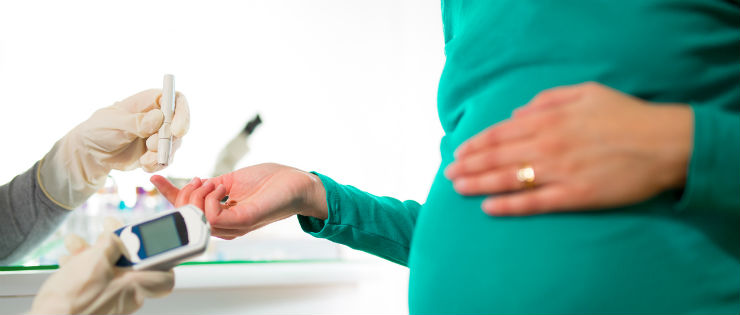
Gestational diabetes is usually diagnosed in the second or third trimester of pregnancy in 10% - 20% of all pregnancies. Also called Gestational diabetes mellitus (GDM), the condition occurs when blood glucose levels become high during pregnancy often due to the hormones produced by the placenta preventing insulin from working properly. If the mother's body cannot produce enough of the extra insulin needed, glucose levels rise and gestational diabetes can develop.
Screening
In Australia, pregnant women are routinely scanned for gestational diabetes between 24 and 28 weeks’ gestation.
What are the Risk Factors?
A craving for sugar while pregnant isn’t one of the risk factors for gestational diabetes, but the following are:
- Diagnosed with gestational diabetes in a previous pregnancy
- Overweight or obese
- Between 25-30 years of age
- Family history of type 2 diabetes
- High blood glucose levels before pregnancy
- Background is Aboriginal or Torres Strait Islander, Melanesian, Polynesian, Chinese, South-east Asian, Middle Eastern or Indian
- History of Polycystic Ovarian Syndrome (PCOS)
While you can’t change the risk factors, you can eat a well-balanced diet throughout your pregnancy and do regular exercise.
Symptoms of Gestational Diabetes
Gestational diabetes has few symptoms, and they are often put down to being pregnant including:
- Excessive thirst
- Need for frequent urination
- Extreme tiredness
- Thrush (yeast infections)
- Blurred vision
- Mood changes
Problems Caused by Gestational Diabetes
Gestational diabetes can cause problems for mothers and their unborn babies. There can be pregnancy complications such as pre-eclampsia for the mother. For babies they can grow too big due to glucose being passed over the placenta requiring them to make insulin to compensate. This leads to the baby storing more fat and tissue. Gestational diabetes can also be the precursor to type 2 diabetes in mothers after pregnancy.
Treating Gestational Diabetes
If your glucose screening test comes back positive, your doctor or obstetrician will probably recommend a low sugar, healthy diet and exercise. You may be seen by an endocrinologist, diabetes educator or dietitian to help with managing the condition. Your blood sugar levels will be regularly monitored, and if they stay within a healthy range, you can avoid insulin injections for the remainder of your pregnancy. All treatment for gestational diabetes can cease once the baby is born. A follow-up blood test may be used to check blood glucose levels in the weeks after the birth.